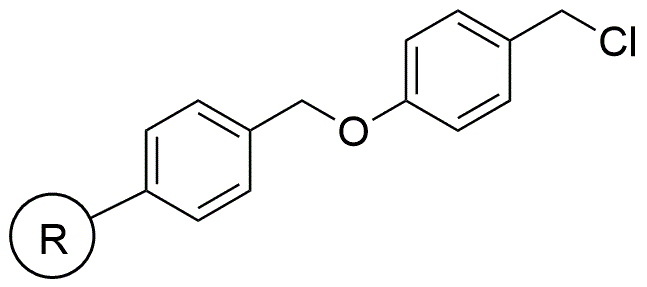4-Benzyloxybenzyl chloride resin is widely utilized in research focused on:
- Solid-Phase Peptide Synthesis: This resin serves as a support for synthesizing peptides, allowing for efficient attachment and cleavage of amino acids, which is crucial in drug development and biochemistry.
- Drug Discovery: It is employed in high-throughput screening processes to create libraries of compounds, facilitating the identification of potential drug candidates in pharmaceutical research.
- Organic Synthesis: The resin is used in various organic reactions, providing a versatile platform for synthesizing complex molecules, which is essential in the fields of materials science and medicinal chemistry.
- Analytical Chemistry: It aids in the purification and isolation of compounds, enhancing the efficiency of analytical methods such as chromatography, which is vital for quality control in manufacturing.
- Bioconjugation: The resin is utilized to attach biomolecules to surfaces or other compounds, improving the development of targeted therapies and diagnostics in the biomedical field.
General Information
Properties
Safety and Regulations
Applications
4-Benzyloxybenzyl chloride resin is widely utilized in research focused on:
- Solid-Phase Peptide Synthesis: This resin serves as a support for synthesizing peptides, allowing for efficient attachment and cleavage of amino acids, which is crucial in drug development and biochemistry.
- Drug Discovery: It is employed in high-throughput screening processes to create libraries of compounds, facilitating the identification of potential drug candidates in pharmaceutical research.
- Organic Synthesis: The resin is used in various organic reactions, providing a versatile platform for synthesizing complex molecules, which is essential in the fields of materials science and medicinal chemistry.
- Analytical Chemistry: It aids in the purification and isolation of compounds, enhancing the efficiency of analytical methods such as chromatography, which is vital for quality control in manufacturing.
- Bioconjugation: The resin is utilized to attach biomolecules to surfaces or other compounds, improving the development of targeted therapies and diagnostics in the biomedical field.
Documents
Safety Data Sheets (SDS)
The SDS provides comprehensive safety information on handling, storage, and disposal of the product.
Product Specification (PS)
The PS provides a comprehensive breakdown of the product’s properties, including chemical composition, physical state, purity, and storage requirements. It also details acceptable quality ranges and the product's intended applications.
Certificates of Analysis (COA)
Search for Certificates of Analysis (COA) by entering the products Lot Number. Lot and Batch Numbers can be found on a product’s label following the words ‘Lot’ or ‘Batch’.
*Catalog Number
*Lot Number
Certificates Of Origin (COO)
This COO confirms the country where the product was manufactured, and also details the materials and components used in it and whether it is derived from natural, synthetic, or other specific sources. This certificate may be required for customs, trade, and regulatory compliance.
*Catalog Number
*Lot Number
Safety Data Sheets (SDS)
The SDS provides comprehensive safety information on handling, storage, and disposal of the product.
DownloadProduct Specification (PS)
The PS provides a comprehensive breakdown of the product’s properties, including chemical composition, physical state, purity, and storage requirements. It also details acceptable quality ranges and the product's intended applications.
DownloadCertificates of Analysis (COA)
Search for Certificates of Analysis (COA) by entering the products Lot Number. Lot and Batch Numbers can be found on a product’s label following the words ‘Lot’ or ‘Batch’.
*Catalog Number
*Lot Number
Certificates Of Origin (COO)
This COO confirms the country where the product was manufactured, and also details the materials and components used in it and whether it is derived from natural, synthetic, or other specific sources. This certificate may be required for customs, trade, and regulatory compliance.


